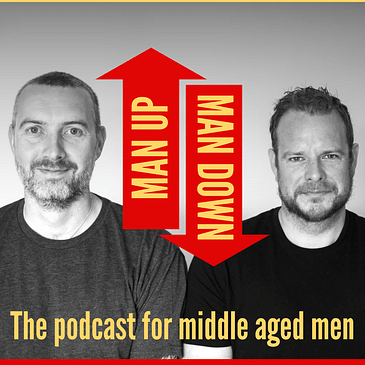Most of us, particularly in our age, have piled on some pounds over the years. Covid didn’t help, lockdowns and less exercise, binge eating and drinking (see episode 3), would have contributed to weight gain. Not to mention the binge eating at McDonalds or the cheeky kebab on the way home.
A six pack is made in the kitchen, not in the gym. Volker lost 10kg a few years ago, partly through exercise but mainly through eating less calories than he took in and watching what he eats. He repeated this again recently and lost about 7kg. But the metabolism changes as you get older, and it is harder to lose weight. As we age, our metabolism slows and the rate at which we break down food decreases by 10% each decade after age 20. Metabolism is the amount of energy (calories) your body uses to maintain itself.
Volker is now doing intermittent fasting, 16:8, which means to not eat for 16 hours from 9 pm until 1 pm and only eat during the hours of 1 and 9 pm. Essentially it means the body is eating its own fat as it is moving into ketosis.
David has done a press-up challenge, steps per day challenge and generally tries to keep fit, yet he still has a few kilos more than he wants to.
What seems to work best to lose weight at our age is to reduce your sugar intake, and if we look at episode 3 again, even if we think we don’t have a high sugar intake, beer and wine have a lot of sugar. And there are lots of hidden sugars in a variety of foods.
MyFitnessPal is a great app we recommend to count your calories and make sure to track how much you eat.
The minimum amount of energy needed to carry out these basic processes while an organism is fasting and at rest is known as the basal metabolic rate, or BMR, which can be calculated using a variety of online calculators that take into account an individual’s height, weight, age, and sex.
BMR is often referred to as resting metabolic rate, or RMR. Total energy expenditure (TEE) is a combination of BMR, plus energy used for physical activities and energy used to digest food (known as dietary thermogenesis). For sedentary adults, BMR accounts for about 50% to 70% of total energy output, dietary thermogenesis for 10% to 15%, and physical activity for the remaining 20% to 30%
Restaurants of a certain size now have to show how many calories a meal contains which should help people to evaluate how much food they should eat each day. Volker regularly orders kids portions to cut down his calorie intake.
We also touched on supplements. Volker regularly takes cod liver oil, electrolyte, focus pills to support your brain performance, vitamin B, C, D, blaseed oil and milk thistle. David swears on heights which seems good value for money combining the main supplements in one ‘magic pill’. The challenge with supplements is that once you are on the treadmill, you have a psychological contract with it that you don’t want to stop.
Oregano pills are recommended for an upset stomach. Disclaimer: do your research prior to taking any supplements, and we are not suggesting you should take any.
Discussing Huel, David doesn’t seem to be a fan, and Volker isn’t too keen on replacement meals either. Whilst they save time to eat, his experience with protein shakes is stomach upsetting. Adding every mineral and nutrition the body needs via a capsule or instant powder instead of real food just doesn’t sound right.
In regards to fitness: Volker has done three marathons, and it seems common in mid life to decide to take on some challenges; David has done a few triathlons, marathons and ultra triathlete and is an active triathlete.
Starting with cycling into London to running with the pram as a stay at home dad. He has done a few marathons and ultramarathons. And one of the motivations to do one was to not have regrets when being older.
Yet, doing a marathon won’t guarantee you to lose weight. As personal trainers suggest, you only have to have a certain heart rate, for Volker around 122, that gets him into the fat burning zone.
Another point we discussed is for men to look like ‘Arnold Schwarzenegger’, using and abusing steroids. There is an increase in steroid abuse: "It is suggested that the majority of AAS use in the UK is for cosmetic reasons, as opposed to enhancement of athletic performance.1, 2
The typical user would be considered by society as fairly ordinary (for example, a 19-year-old male who wishes to optimise his physique inspired by reality TV shows; or, a 45-year-old male who needs an outlet from pressures at home and work; or a 62-year-old male who aims to recreate the care-free experiences of his youth).
However, what most have in common is a desire for extreme masculinity and an increase in self-esteem.”
This is another important factor to consider. Some people want to look ‘manly’ and think that we need to look ripped and muscular to look like a man. Personally, Volker thinks just not having a big beer gut is a good achievement.
We have friends at our age who traded in for a ‘younger model’, with people getting a high motivation finding a younger woman which results in them losing weight quickly. So once we know why, it’s a question of how.
And whilst there are a lot of promises out there on how to lose weight quickly, the why is super important. Volker quit smoking a few years, from 60 to no cigarettes within a day, cold turkey, but the reason was there to live a healthier life, not dying of lung cancer. Those shock mechanisms definitely work.
And let’s not forget, if you have a healthy sex life, you can burn more calories. Research has found that men burn an average of 101 calories during sex, or about 4.2 calories burned per minute. We could argue how many minutes that is… women burn an average of 69 calories during sex, or about 3.2 per minute.
Have you lost weight or got super fit during your middle ages and want to share your story? Who should we speak to in order to investigate this topic further? Please let us know on podcast@manupdown.com
Hosted on Acast. See acast.com/privacy for more information.




